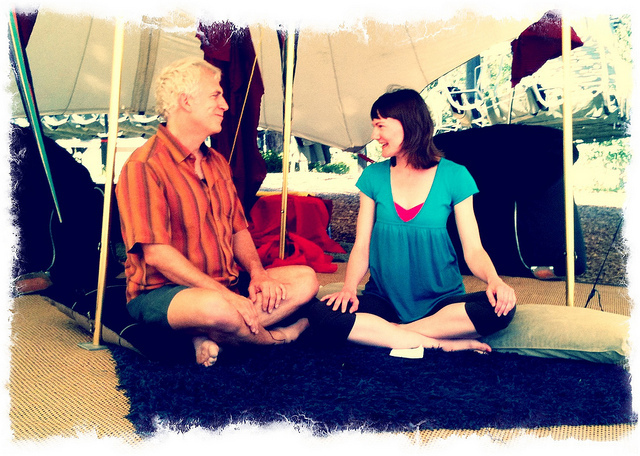
“As for the future, your task is not to foresee it but to enable it.” ~Antoine de Saint-Exupéry
Have you ever heard the expression everyone loves a cheerful giver? While there’s a great deal of truth in the philosophy of offering without hopes attached, what about the flip side?
Sometimes we become so focused on providing antidotes or anticipating what we perceive to be the other person’s needs that we steamroll a conversation, taking center stage in our interactions.
In my own day-to-day life, pauses and hesitations in conversation used to make me uncomfortable or even anxious. I would rush to fill the space with chit chat that meant little, or offer to help that person with a favor—not so much to experience the joy of giving another person a break but to alleviate the unease inside me.
Coming from a place of fear, I frequently dampened the point of the conversation with my desires to keep the talk flowing and elicit the behavior I wanted from others.
As a one-time people pleaser, I knew that there had to be a more peaceful way to connect, and on a deeper level, with those around me.
After I turned thirty, I began to step back and actually give other people room to express their opinions and thoughts—even if it meant several seconds of complete silence, something that previously would have seemed impossible to me.
I found myself breathing more slowly and relaxing more into the moment. I started to feel the same happening to others I interacted with.
As people began opening up to share their true awareness because I was listening more willingly, a beautiful space of appreciation for them opened within myself.
By taking one step back, I’ve frequently been surprised at what the other person decides to share.
For one friend, it was a bad day that I probably otherwise wouldn’t have been as compassionate about because I would have steered the conversation toward my own frustrations.
Then there was the neighbor who began to look across the hedge while we talked, which previously I would have considered a sign of boredom. But suddenly she said, “You know, I think I forgot to thank you last month when I was sick and you wheeled my garbage out to the curb with yours. I appreciated that.”
I’d assumed she’d forgotten or hadn’t noticed that simple good deed. If I had rushed the conversation forward, as I’ve typically done, I would have missed the softening of her features and her moment of acknowledgment, a gift in itself.
When we allow a quiet, neutral space for deep breathing and awareness, suddenly the flow of conversation becomes more natural—a wave upon the shore, ebb and flow, rather than a spiking of blood pressure—and the other person rises to meet us with authenticity.
Wouldn’t we like to inspire the truth of what another person wants to give rather than start a set of reactions that mean less about connection and more about lobbing back a response?
How can we learn to step aside and let someone else have the growth experience of opening up and giving their thoughts a voice?
1. Embrace the silence.
Don’t rush to fill pauses. Most of what we typically perceive as awkwardness is simply waiting for either ourselves or the other person to consider what to say next. Pauses create space for more honest communication.
2. Listen.
Without rushing ahead in your mind, pay attention to the other person’s actual message, in word or deed or body language.
Does the other person have crossed arms? Perhaps this isn’t the best time for them to talk. Conversely, if they have open body posture, you might be just the person they need to talk to today.
Either way, focus on the other person, and reign in the monkey mind that rushes ahead and then backward to last week and then sideways to an after-work grocery list and appointments. In this moment, your only concern should be the other person.
I don’t know about you, but I’ve not yet experienced too many listeners in this world. Truthfully, how many of us can anticipate the true contents of another person’s thoughts without offering that kind of focused attention?
Don’t get me wrong—it would be a disservice to agree with everything someone says or does to please them or to eliminate conflict. But just being heard is a powerful experience that often lessens others’ built-up defenses and helps them feel understood, even if two people don’t quite see eye-to-eye.
3. Know that you are part of the conversation or interaction, but are in no way responsible for directing it.
Grasping for words to elicit a smile or create a certain response can actually drive people further away and promote more insecurity or frustration. Sometimes letting go of a person’s time or energy is actually the healthiest for both parties.
Accept that a conversation or interaction may draw to a swift close, but that doesn’t mean there’s no closure in the experience.
Of course, it’s quite possible that as soon as the other person feels the slackening of your expectations, (s)he will unconsciously begin to speak or act from a deeper, more authentic vantage point.
Either way, let go of a preconceived desire for the other person to react in the way you’d hoped. Receive the other person’s message and realize that within yourself is the ability to take part, to listen, and then to move forward with acceptance, whatever the person’s responses.
When we let go of conversational expectation and stop rushing in to fill pauses, we make room for others to give more of themselves. What we reap in open-hearted listening and a compassionate approach to others often benefits giver and receiver alike.
Photo by brad.coy
About MK Miller
MK Miller has two degrees and limitless curiosity. She has written about a wide array of topics– including the cultural significance of go-go boots. She rides her bike almost daily, pays bills monthly, and collects books and shoes perennially.













 Though I run this site, it is not mine. It's ours. It's not about me. It's about us. Your stories and your wisdom are just as meaningful as mine.
Though I run this site, it is not mine. It's ours. It's not about me. It's about us. Your stories and your wisdom are just as meaningful as mine.
So true. I understand that conversation is a two way deal. You’ve to listen, add to it, embrace what you don’t understand, ask elaboration and have lots and lots of positive vibes.
I really enjoyed this post. I recently moved to a new place and I struggle with this discomfort almost daily. One of the challenges I have chosen for myself here is to be with people. Thanks for pointing me in this direction.
Be well.
This is particularly interesting in light of the conflict my partner and I got into last night — I was expecting comfort from him, as he had been able to give many times before. But because he was on edge, unhappy — he was unable to give me the space, and unable to pick apart what I was saying to figure out the emotions attached to the litany. And as we become parents… this is even more important, even from the infant stage.
MK-Thanks for using my picture at the top! I usually do go for the “less is more” approach when interviewing folks. If you are too chatty, it can detract from an interview or conversation for sure. Great post, keep ’em coming!
Blessings~
Through the counseling I’ve had in the past few years, I realized that since I was young, I had not been “heard”… by friends, people I’ve dated and especially by my parents. I recently developed this annoying habit of cutting people off in casual conversation (to interject my thoughts) and I couldn’t understand why I did that, because I am normally a very good listener. After recognizing the connection between that habit and my background, I realized that it was my way of getting my ideas/thoughts in before the other person had the chance to walk away, end the conversation or disregard my turn to talk. It’s something I’ve been really working on lately (I think, “JUST LISTEN” as the other person is talking), and it made me realize what a gift patiently listening is… there’s nothing better than feeling like you were truly heard in a conversation.
This article is such a great reminder of the simple things we can do to better relationships and show compassion to others. Centering ourselves and being mindful while someone else is speaking along with being aware of our own agendas really creates an openness that doesn’t exist when all you’re doing is waiting for your turn to speak.
Embracing silence is difficult for me; I always feel the need to fill that space. Listening is high art. Thich Nhat Hanh says “We know that many people suffer, feeling that no one is able to understand them or their situation. Everyone is too busy and no one seems to have the capacity to listen. But all of us need someone who can listen to us. Deep listening, compassionate listening is not listening with the purpose of analyzing or even uncovering what has happened in the past. You listen first of all in order to give the other person relief, a chance to speak out, to feel that someone finally understands him or her.” I just accidently laundered my mega millions ticket, but I’m feeling quite lucky with tip number three. Thank you so much for this post.
Excellent article. Reminds me of the adage we have two ears and one mouth because we are supposed to listen twice as much as we talk. It can be really easy to stop listening and start planning what I am going to say next. What a great and gentle reminder to practice listening.
Thank you for your kind words, Allan! Funny you should mention the two ears and one mouth adage: one of my best friends says that all of the time and it always makes me smile at the truth of the statement. 🙂 Namaste and all best to you, as we all practice the art of listening.
I agree, Evan. Listening is defintely a high art. Thank you for the Thich Nhat Hanh quotation; I always enjoy his teachings and eloquence. I apreciate your kind feedback. Namaste.
I appreciate you sharing your experiences, Alannah. Counseling can be so illuminating! 🙂 I am humbled and grateful that my work reminded you of your own life experiences. All the best to you.
You’re very welcome, GingerCoy. I must humbly give props to Lori, who ultimately decides which photos to use. I love your picture and it surely coordinates so well with the message of my thoughts. Thanks for your wonderful, encouraging spirit. Namaste!
Congratulations on your pregnancy, Kate! 🙂 I am touched that my words speak to you about your own recent experiences. That has been one of the best and most gratifying experience about sharing my thoughts and articles with Tiny Buddha readers– connecting to the humanity and experiences that we share in common. Namaste and all good things to you and your expanding family!
Thank you for your kind words, Pat. Moving to a new place can be very challenging and also a good opportunity to meet new people and to learn something new, both about others and about self. I wish you good experiences and warm new friends. I appreciate you taking the time to leave feedback on my article. Namaste!
Thank you, Jaky. I’m glad that you took the time to read my article and to leave feedback. 🙂
Thank you, Jaky. I’m glad that you took the time to read my article and to leave feedback. 🙂
Wonderful post and great comments!
Listening is sometimes difficult… for me it’s most difficult when I feel thrilled to be connecting with the people around me. This sets off my “chatter” mode! 🙂
When I know this could be a situation I will be in, I get ready! The one technique that works for me is to remove the focus on myself and what I need to say, and focus 100% on the other person. This really helps me to listen with intent.
I continually practice improving my authentic communication skills and do the same in my coaching and consulting business. I also speak on how to ask for and offer authentic feedback… and the best way to do this is through self-awareness. Authentic listening is most effective when it stems from a knowledge of self.
Honored to comment here and looking forward to more!
Sonia Di Maulo
http://www.readytofeedback.com
Wow, what great timing this post was! This exact thing is one of my quasi-resolutions. I have a friend, whom I admire greatly for having exactly these qualities, and always wish I could be more like that when talking with someone. I find myself rushing to fill lapses in conversation, too, even if I’m totally off topic. My monkey mind is always leading my conversations! Thank you for these tips!
Wow, what great timing this post was! This exact thing is one of my quasi-resolutions. I have a friend, whom I admire greatly for having exactly these qualities, and always wish I could be more like that when talking with someone. I find myself rushing to fill lapses in conversation, too, even if I’m totally off topic. My monkey mind is always leading my conversations! Thank you for these tips!
Thanks so much for your comments, Jeneenhag. Listening more and more closely is a wonderful resolution– and one of mine for the New Year, too. 🙂 Namaste!
I know what you mean, Sonia. When I’m excited to be talking to someone, that’s usually when “chatter mode” happens for me, too. I find this is especially so when it’s someone I don’t see regularly and so there’s been a build-up of things I want to say. That, of course, is the time when I most need to step back and let go of running the conversation, and instead listen in a focused and open-hearted way. It’s such a pleasure to read your comments, and I am humbled and happy that you enjoyed my posting. Namaste! 🙂
[…] an effort to really listen—not just wait to […]
[…] an effort to really listen—not just wait to […]
[…] attention to what happens to your energy when you talk less, and how much happier you feel as you conserve more energy. Plus, you will love the simple intimacy […]
[…] with trials every now and then, like you. It is adventurously therapeutic for you to walk together, communicate authentically, and support each other through times of […]
[…] Clear the emotional fog enough to receive the message. If you need to ask for clarification or even repeat what you think the other person is trying to […]
I wish you excellent times and heated new buddies. I appreciate you making the effort to keep reviews on my article.google